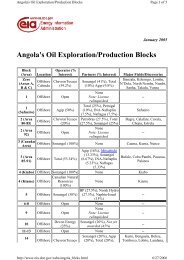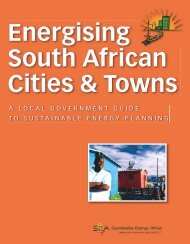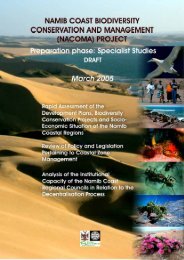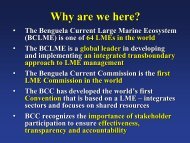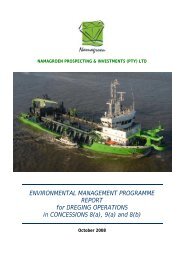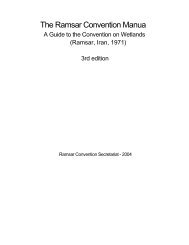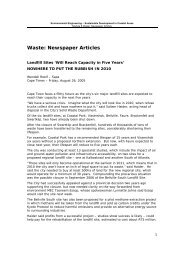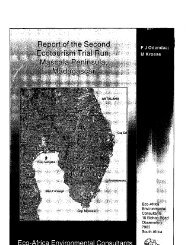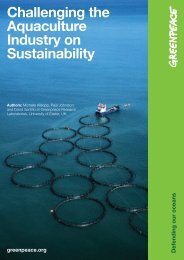Feasibility Study of Proposed Tourism Dev in Shewula, NE ...
Feasibility Study of Proposed Tourism Dev in Shewula, NE ...
Feasibility Study of Proposed Tourism Dev in Shewula, NE ...
You also want an ePaper? Increase the reach of your titles
YUMPU automatically turns print PDFs into web optimized ePapers that Google loves.
Chapter 7 - Conclusions<br />
7.1.3.2. Positive factors<br />
There is significant potential for the project to <strong>of</strong>fer a unique tourism experience and<br />
to create an environment conducive to the susta<strong>in</strong>able use <strong>of</strong> <strong>Shewula</strong>'s natural<br />
resources; and the fact that the project has arisen out <strong>of</strong> an awareness <strong>of</strong> the<br />
opportunities for more effective and beneficial use <strong>of</strong> the Community's assets is, <strong>in</strong><br />
itself, a strength <strong>of</strong> the project.<br />
Furthermore, there are numerous resources that have already been identified as<br />
assets for the project, <strong>in</strong>clud<strong>in</strong>g:<br />
• The unique location <strong>of</strong> <strong>Shewula</strong>,, with its spectacular views and appeal<strong>in</strong>g<br />
natural and socio-cultural character;<br />
• The establishment <strong>of</strong> the Lubombo Conservancy and associated opportunities<br />
for co-operative management, plann<strong>in</strong>g and market<strong>in</strong>g;<br />
• Fund<strong>in</strong>g, for both the tourism development itself and strengthen<strong>in</strong>g the<br />
community's capacity to undertake the development;<br />
• Numerous possibilities for tourism activities, <strong>of</strong> both a cultural and ecological<br />
nature;<br />
• Local <strong>in</strong>habitants who could be employed for the construction and operation<br />
phases <strong>of</strong> the project;<br />
• Build<strong>in</strong>g materials, from local and nearby regional sources;<br />
• Local skills and expertise <strong>in</strong> conservation, tourism and bus<strong>in</strong>ess management.<br />
Opportunities for obta<strong>in</strong><strong>in</strong>g resources that will further strengthen the project <strong>in</strong>clude:<br />
• The possibility <strong>of</strong> obta<strong>in</strong><strong>in</strong>g further fund<strong>in</strong>g from government and other<br />
<strong>in</strong>itiatives;<br />
• Possibilities for establish<strong>in</strong>g relationships with other parties, which could<br />
facilitate:<br />
• co-operative management;<br />
• learn<strong>in</strong>g from others <strong>in</strong>volved <strong>in</strong> similar exercises elsewhere;<br />
• borrow<strong>in</strong>g the necessary equipment and mach<strong>in</strong>ery for the construction<br />
phase <strong>of</strong> the project.<br />
7.1.4. Community-related factors affect<strong>in</strong>g the project<br />
The status <strong>of</strong> the Community members as primary stakeholders, and their role <strong>in</strong> /<br />
<strong>in</strong>volvement with the project <strong>in</strong> its various phases is a key component <strong>of</strong> this<br />
assessment <strong>of</strong> the project's short-and long-term viability. With regard to the strengths .<br />
and weaknesses <strong>of</strong> the proposed project, the fact that it is based with<strong>in</strong> the <strong>Shewula</strong><br />
community, makes its viability heavily dependent on the response <strong>of</strong> this community to<br />
the project, and the attitudes and behaviour <strong>of</strong> local residents towards the project.<br />
7.1.4.1. Constra<strong>in</strong>ts<br />
There are several community-related constra<strong>in</strong>ts that have the potential to negatively<br />
affect the feasibility <strong>of</strong> the project. These <strong>in</strong>clude:<br />
• Lack <strong>of</strong> awareness, lack <strong>of</strong> understand<strong>in</strong>g and uncerta<strong>in</strong>ty<br />
• Lack <strong>of</strong> participation<br />
• Lack <strong>of</strong> access to <strong>in</strong>formation<br />
a) Lack <strong>of</strong> awareness, lack <strong>of</strong> understand<strong>in</strong>g and uncerta<strong>in</strong>ty At present, the<br />
understand<strong>in</strong>g <strong>in</strong> the <strong>Shewula</strong> community, about tourism especially, but also<br />
conservation, natural resource management, and bus<strong>in</strong>ess, is <strong>in</strong>sufficient to susta<strong>in</strong> a<br />
dramatic <strong>in</strong>flux <strong>of</strong> tourists, contractually b<strong>in</strong>d<strong>in</strong>g agreements with private operators or<br />
extensive nature conservation <strong>in</strong>itiatives <strong>in</strong> the <strong>Shewula</strong> reserve.<br />
155



